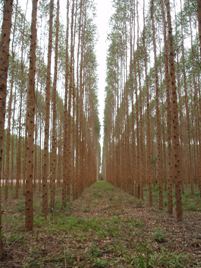GBM Blog
‘The green blanket of death’
 The support of SMART Agriculture and forests at the UN Climate Change Conference (COP17) in Durban, South African, in order to promote eucalyptus in the water catchment areas is of great concern to the Green Belt Movement (GBM).
The support of SMART Agriculture and forests at the UN Climate Change Conference (COP17) in Durban, South African, in order to promote eucalyptus in the water catchment areas is of great concern to the Green Belt Movement (GBM).
We work with women at the grassroots in order to conserve the environment and improve livelihoods. However, eucalyptus plantations do the opposite and negatively affect water resources, biodiversity, community health, security and local economies. Specifically, eucalyptus plantations deplete water resources, reduce biodiversity, increase flooding, reduce nutrient cycling, affect soil properties and compete with crops for growth resources.
The bottom line is that these plantations are not forests; they are monocultures that destroy any competing flora in their path and create an environment unsuitable for most fauna. They cannot be the solution that grassroots communities are looking for in order to adapt to climate change. In fact, grassroots communities’ survival is threatened by these plantations because they are incapable of providing essential environmental services that supports local livelihoods. One of the most important ecosystem services that indigenous forests provide is the regulation of climate and rainfall patterns. Efforts to justify these plantations for economic reasons fail to recognize this fundamental incompatibility and the inability of exotic plantations to provide the essential environmental services, without which communities cannot survive.
We need a holistic ecosystem management for food production, biodiversity, water and soil conservation by grass root communities.
The poorest and most vulnerable in society, including women and children, need to be protected from climate change. However, their issues are far removed from the negotiations at COP17. The negotiations are instead opening doors for damaging agricultural practices which reduces food crops and makes grassroots communities even more vulnerable. GBM does not believe that life should be sold or negotiated in a stock market. The governments and development agencies need to think of what they need to stop doing rather than what they need to do. They need to go back to the drawing board and re-analyze what worked in the past and upscale traditional practices to help grassroots communities to build resilience. Supporting local coping strategies alone is not sufficient to adapt to climate change. The underlying causes of vulnerability must be addressed. Therefore, understanding vulnerability of grassroots communities as well as social and environmental sustainability is critical at all scales from the local to the international in order to shift development pathways and effectively adapt to Climate Change.
